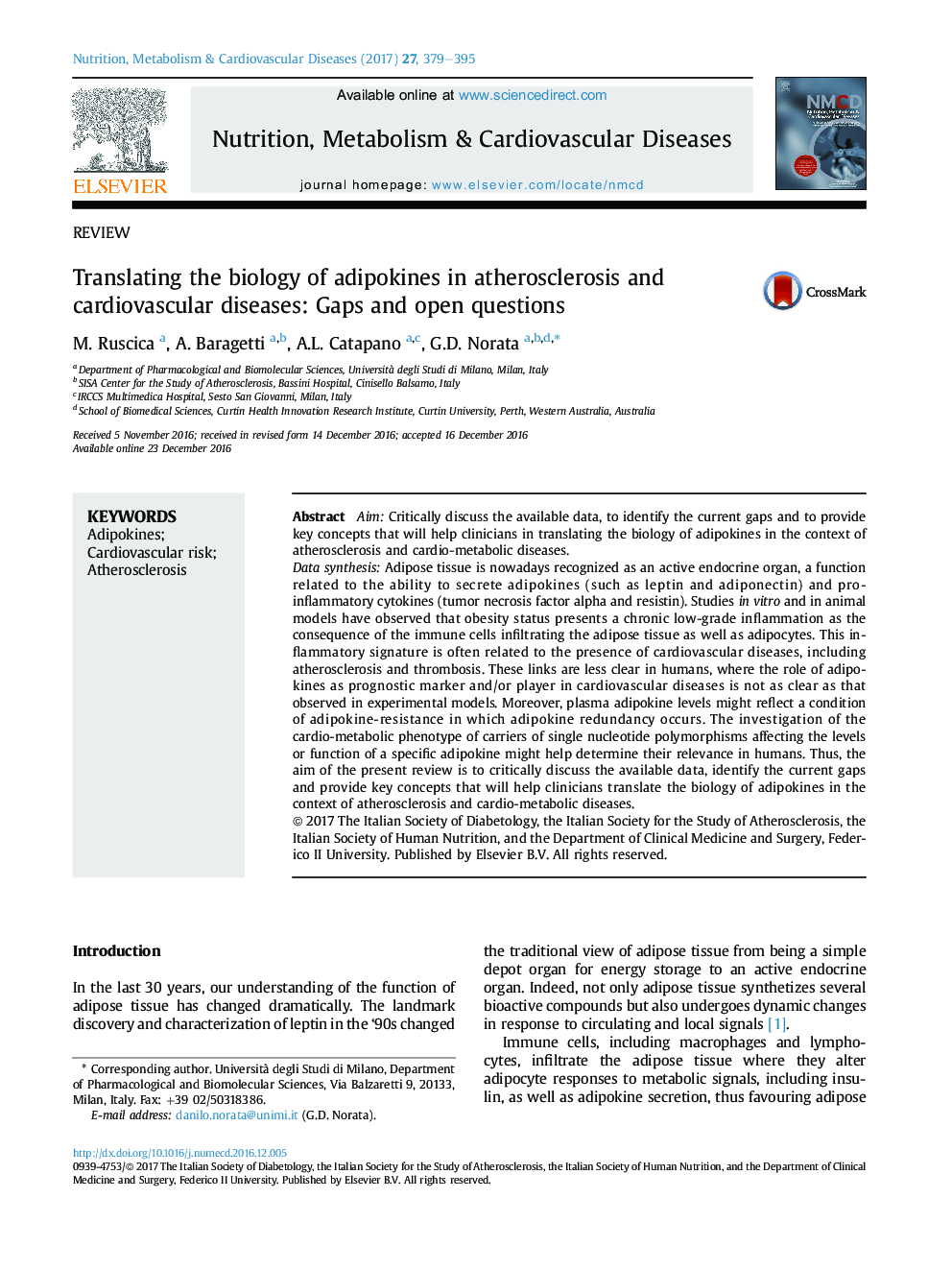| کد مقاله | کد نشریه | سال انتشار | مقاله انگلیسی | نسخه تمام متن |
|---|---|---|---|---|
| 5619040 | 1406050 | 2017 | 17 صفحه PDF | دانلود رایگان |
عنوان انگلیسی مقاله ISI
Translating the biology of adipokines in atherosclerosis and cardiovascular diseases: Gaps and open questions
ترجمه فارسی عنوان
ترجمه زیست شناسی آدپیوکین ها در بیماری های آترواسکلروز و بیماری های قلبی عروقی: شکاف و سوالات باز
دانلود مقاله + سفارش ترجمه
دانلود مقاله ISI انگلیسی
رایگان برای ایرانیان
کلمات کلیدی
ترجمه چکیده
بافت چربی در حال حاضر به عنوان یک عضو اندوکرین فعال شناخته شده است، یک عملکرد مربوط به توانایی ترشح آدیپوکین ها (مانند لپتین و آدیپونکتین) و سیتوکین های پرولاکتوز (فاکتور نکروز تومور آلفا و مقاومت آن). مطالعات در آزمایشات آزمایشگاهی و در مدل های حیوانی نشان داده اند که وضعیت چاقی، التهاب مزمن پایین مزمن را به عنوان نتیجه سلول های ایمنی که نفوذ بافت چربی و آدفوسیت ها را نفوذ می کند، ارائه می دهد. این امضای التهابی اغلب با وجود بیماری های قلبی عروقی، از جمله آترواسکلروز و ترومبوز مرتبط است. این پیوندها در انسان کم رنگ تر است، جایی که نقش آدیپوکین ها به عنوان نشانگر پیش آگهی و / یا بازیکن در بیماری های قلبی عروقی به همان اندازه که در مدل های آزمایشی دیده نمی شود، روشن نیست. علاوه بر این، سطح آدپیوکین پلاسما ممکن است منعکس کننده ی وضعیت مقاومت به آدیپکین باشد که در آن اضافهکاری آدیپوکین رخ می دهد. بررسی فنوتیپ قلب و متابولیسم حامل های پلی مورفیسم تک نوکلئوتیدی که بر سطح یا عملکرد یک آدپیوکین خاص تاثیر می گذارد ممکن است به تعیین ارتباط آنها در انسان کمک کند. بنابراین هدف بررسی حاضر این است که به طور انتقادی درباره داده های موجود بحث کنیم، شکاف های فعلی را شناسایی کنیم و مفاهیم کلیدی را ارائه دهیم که به پزشکان کمک خواهد کرد که زیست شناسی آدپیوکین ها را در زمینه بیماری های قلبی و متابولیک ترجمه کنند.
موضوعات مرتبط
علوم پزشکی و سلامت
پزشکی و دندانپزشکی
کاردیولوژی و پزشکی قلب و عروق
چکیده انگلیسی
Adipose tissue is nowadays recognized as an active endocrine organ, a function related to the ability to secrete adipokines (such as leptin and adiponectin) and pro-inflammatory cytokines (tumor necrosis factor alpha and resistin). Studies in vitro and in animal models have observed that obesity status presents a chronic low-grade inflammation as the consequence of the immune cells infiltrating the adipose tissue as well as adipocytes. This inflammatory signature is often related to the presence of cardiovascular diseases, including atherosclerosis and thrombosis. These links are less clear in humans, where the role of adipokines as prognostic marker and/or player in cardiovascular diseases is not as clear as that observed in experimental models. Moreover, plasma adipokine levels might reflect a condition of adipokine-resistance in which adipokine redundancy occurs. The investigation of the cardio-metabolic phenotype of carriers of single nucleotide polymorphisms affecting the levels or function of a specific adipokine might help determine their relevance in humans. Thus, the aim of the present review is to critically discuss the available data, identify the current gaps and provide key concepts that will help clinicians translate the biology of adipokines in the context of atherosclerosis and cardio-metabolic diseases.
ناشر
Database: Elsevier - ScienceDirect (ساینس دایرکت)
Journal: Nutrition, Metabolism and Cardiovascular Diseases - Volume 27, Issue 5, May 2017, Pages 379-395
Journal: Nutrition, Metabolism and Cardiovascular Diseases - Volume 27, Issue 5, May 2017, Pages 379-395
نویسندگان
M. Ruscica, A. Baragetti, A.L. Catapano, G.D. Norata,
